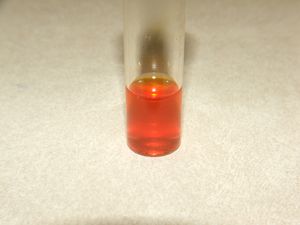May 2 2012
3
02
/05
/May
/2012
13:04
Hydrogen peroxide is a rather unstable material. It has a strong tendency to exothermically decompose to water and oxygen. This process is limited in drug store hydrogen peroxide by the addition of a stabilizer such as phenacetin. However, certain substances vastly accelerate the decomposition of hydrogen peroxide. One of them is blood, where the enzyme catalase breaks down hydrogen peroxide very quickly and efficiently. Other inorganic compounds break down hydrogen peroxide too.
Iodide: This is used in the famous "elephant's toothpaste" demonstration. 30% hydrogen peroxide is mixed with detergent and some potassium iodide is added, after which it vigorously foams up to 30 times its original size. This is not my video. Iodide's decomposition is quite fast, as is evident by these pictures.
Copper(II) chloride: This is another strong catalyst in the decomposition of hydrogen peroxide. The green solution visible at the end of this video decomposes the hydrogen peroxide quite rapidly.
Alkali and alkaline earth metal salts: These decompose hydrogen peroxide slowly. Of all of the salts that I tried the carbonates and bicarbonates caused the most decomposition, undoubtedly because of the basic solution produced.
Manganese dioxide: One of the most well - known catalysts for hydrogen peroxide, manganese dioxide vigorously and completely decomposes hydrogen peroxide, causing a dirty brownish-black solution to be left behind. The other lower manganese oxides also decompose hydrogen peroxide but to a lesser extent.
Cobalt(II) chloride: Cobalt(II) chloride, like most transition metal salts, decomposes hydrogen peroxide relatively fast, but not in a spectacular way.
Silver compounds: Soluble silver compounds are also excellent decomposition catalysts. When silver covered in a chloride crust is immersed in hydrogen peroxide, vigorous fizzing begins which only slows a little when acidified by acetic acid. Catalysis continues until all of the peroxide is depleted.
Other precious metals: Platinum sponge and other precious metal catalysts likely have a strong effect on peroxide decomposition, but I could not obtain any of these for experimentation.
Iron(II) compounds: These are used to make Fenton's reagent by reaction with hydrogen peroxide. While they destabilize hydrogen peroxide to some extent they are not as strong a catalyst as the other transition metal compounds.
Chromium(VI) compounds: These actually react with hydrogen peroxide, forming a metastable coordination complex. It soon decomposes, giving off oxygen and returning to the original state in some cases. If it does so (which it does more in basic solution), it is a catalyst, although a slow catalyst in comparison with normal ones.
Titanium compounds: These form a bright red and surprisingly stable peroxo complex with titanium.

Most other metals only decompose hydrogen peroxide to a fair extent or are actually oxidized by it.


